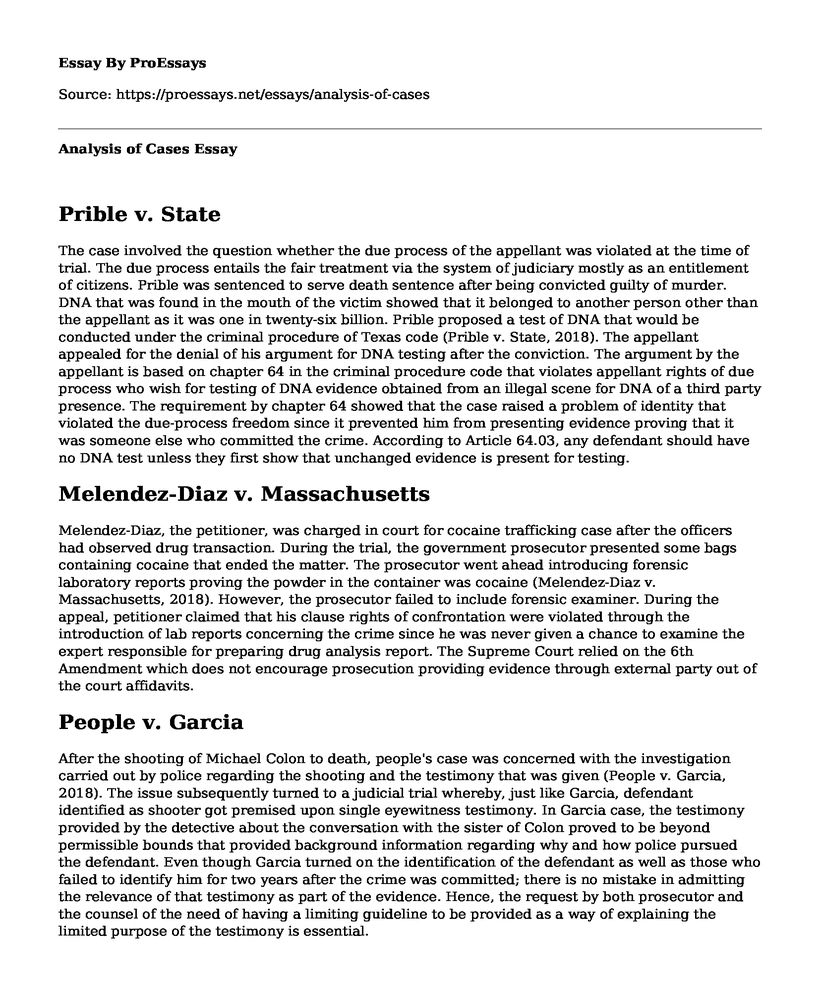Prible v. State
The case involved the question whether the due process of the appellant was violated at the time of trial. The due process entails the fair treatment via the system of judiciary mostly as an entitlement of citizens. Prible was sentenced to serve death sentence after being convicted guilty of murder. DNA that was found in the mouth of the victim showed that it belonged to another person other than the appellant as it was one in twenty-six billion. Prible proposed a test of DNA that would be conducted under the criminal procedure of Texas code (Prible v. State, 2018). The appellant appealed for the denial of his argument for DNA testing after the conviction. The argument by the appellant is based on chapter 64 in the criminal procedure code that violates appellant rights of due process who wish for testing of DNA evidence obtained from an illegal scene for DNA of a third party presence. The requirement by chapter 64 showed that the case raised a problem of identity that violated the due-process freedom since it prevented him from presenting evidence proving that it was someone else who committed the crime. According to Article 64.03, any defendant should have no DNA test unless they first show that unchanged evidence is present for testing.
Melendez-Diaz v. Massachusetts
Melendez-Diaz, the petitioner, was charged in court for cocaine trafficking case after the officers had observed drug transaction. During the trial, the government prosecutor presented some bags containing cocaine that ended the matter. The prosecutor went ahead introducing forensic laboratory reports proving the powder in the container was cocaine (Melendez-Diaz v. Massachusetts, 2018). However, the prosecutor failed to include forensic examiner. During the appeal, petitioner claimed that his clause rights of confrontation were violated through the introduction of lab reports concerning the crime since he was never given a chance to examine the expert responsible for preparing drug analysis report. The Supreme Court relied on the 6th Amendment which does not encourage prosecution providing evidence through external party out of the court affidavits.
People v. Garcia
After the shooting of Michael Colon to death, people's case was concerned with the investigation carried out by police regarding the shooting and the testimony that was given (People v. Garcia, 2018). The issue subsequently turned to a judicial trial whereby, just like Garcia, defendant identified as shooter got premised upon single eyewitness testimony. In Garcia case, the testimony provided by the detective about the conversation with the sister of Colon proved to be beyond permissible bounds that provided background information regarding why and how police pursued the defendant. Even though Garcia turned on the identification of the defendant as well as those who failed to identify him for two years after the crime was committed; there is no mistake in admitting the relevance of that testimony as part of the evidence. Hence, the request by both prosecutor and the counsel of the need of having a limiting guideline to be provided as a way of explaining the limited purpose of the testimony is essential.
House v. Bell
In the case involving House v. Bell, Supreme Court needed to consider if the newly provided evidence that was introduced in the habeas proceedings was adequate to allow a procedural default of House being actual innocence. The court held the majority of claims by House as being other decided correctly by government courts, or they were barred in following required procedure. House advanced the three suits he had for his innocence (House v. Bell, 2018). The court concluded that even if the semen found on the victim did not belong to House, it did not contradict the evidence showing that he committed murder.
References
House v. Bell, (2018). Retrieved from https://caselaw.findlaw.com/us-supreme-court/547/518.html
Melendez-Diaz v. Massachusetts, (2018). Retrieved from https://caselaw.findlaw.com/us-supreme-court/557/305.html
People v. Garcia, (2018). Retrieved from https://caselaw.findlaw.com/ca-court-of-appeal/1676904.html
Prible v. State, (2018). Retrieved from https://caselaw.findlaw.com/tx-court-of-criminal-appeals/1365414.html
Cite this page
Analysis of Cases. (2022, Jun 10). Retrieved from https://proessays.net/essays/analysis-of-cases
If you are the original author of this essay and no longer wish to have it published on the ProEssays website, please click below to request its removal:
- Research Paper on the Similarities Between Organized Crime and Terrorism
- Anomie, Social Change, and Crime Essay
- William Rodriguez Case Study
- Abnormal Psychology - Essay Sample
- Essay Example on Plaintiff's Legal Claim: Seeking Damages in Court
- Essay Example on Free Black Activism: Demanding Rights, Justice, and Liberty
- Criminal Investigations: From Hammurabi's Code to Modern Era - Essay Sample







